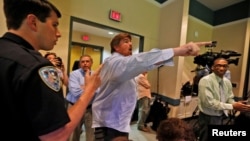Republican Congressman Steve Womack got an earful from constituents in his Arkansas district Tuesday when he downplayed the need for a special committee to investigate any ties President Donald Trump may have to Russia.
“You guys wasted a lot of money on Benghazi,” one man at the town hall meeting shouted, referring to years of congressional investigations into former secretary of state Hillary Clinton’s handling of the 2012 attack in Libya that left four Americans dead. “Waste a little on Trump!”
In Iowa, Afghan refugee Zalmay Naizi pleaded with Republican Senator Chuck Grassley for assurances that he will be safe in the United States now that Trump is president.
“I am a person from a Muslim country and I am a Muslim,” Naizi said in a crowded room where Grassley was fielding questions. “Who is going to save me here? Who’s going to stand behind me?”
In Ohio, scores of demonstrators surrounded the historic home of former president Warren Harding, where Republican Congressman Jim Jordan made a President's Day visit on Monday.
“Town hall now! Town hall now!” the crowd chanted in unison.
Jordan emerged, took a microphone, and defended his party’s efforts to dismantle former President Barack Obama’s signature domestic achievement, the Affordable Care Act, or Obamacare.
“I was pretty clear with the voters where I stood on the ACA during the last election,” Jordan said after his efforts to explain the merits of repealing the law were interrupted with jeers and boos.
“Give us our insurance! Give us our insurance!” the crowd chanted in response.
Applying pressure
Similar scenes have played out at political gatherings across the nation. Normally sedate and sparsely attended, town halls hosted by Republicans have been overwhelmed by outspoken and, at times, raucous dissenters.
“One of the biggest things we want to do is to continue to apply pressure for our beliefs,” said Paul Smith, who showed up at an event hosted by California Republican Congressman Tom McClintock. “And it is as much about resisting Trump’s policies and the Trump agenda as it is showing the world what we believe in.”
“They [protesters] are angry constituents letting their elected officials know about that anger,” said political analyst John Hudak at the Washington-based Brookings Institution. “This is likely to be a force to be reckoned with in large part because these are not sit-ins in public squares; these are individual voters voicing their specific concerns face-to-face with their elected officials, and that’s oftentimes very difficult for an elected official to turn their back on.”
The grassroots activism has not gone unnoticed.
“The so-called angry crowds in home districts of some Republicans are actually, in numerous cases, planned out by liberal activists. Sad!” President Trump wrote on Twitter.
The response from Republican lawmakers themselves has varied.
Michigan Congressman Justin Amash responded to Trump’s tweet with one of his own.“They [protesters] are our fellow Americans with legitimate concerns. We [Republicans] need to stop acting so fragile. I'm proud to defend liberty and the Constitution.”
“Certainly it’s disappointing when people get out of hand and don’t act like adults,” said Representative Buddy Carter of Georgia. “But at the same time, we all respect our First Amendment rights [to free speech].”
Many voicing dissent at town halls have expressed left-of-center viewpoints; but, it would be a mistake to dismiss them as Democratic or progressive operatives, according to Hudak.
“I’m sure there are plenty of liberals and Democrats in these protests,” he said. “But I don’t think you have to be particularly liberal to not want to lose your health care. I don’t think you have to be particularly liberal to be offended by some of the president’s rhetoric.”
Some Republicans have canceled public events or limited them to forums where they can exercise a degree of control over who attends. In response, demonstrators have staged mock town halls with cardboard cut-outs of lawmakers on display.
“Oh Darrell, where are you? We’ve been waiting here so long,” sang a crowd to a life-sized photo of Congressman Darrell Issa of California, who later held an outdoor event that descended into chaos when liberal and conservative attendees began shoving each other and attempted to shout each other down.
Deja vue
Today’s demonstrations mirror those mounted against Democrats in 2009, when the party controlled the White House and both houses of Congress – just as Republicans do today. Senator Mark Warner of Virginia was one of many Democrats who ran into vocal opposition at town hall meetings over then-President Obama’s plans to reform America’s health care system.
Warner elicited a hail of boos from a testy crowd when explaining a central plank of Obamacare: compelling people to purchase private health care insurance.
“Just as we require you to buy car insurance, I believe you should be buying a minimum [health care] insurance plan,” Warner told constituents in Fredericksburg in September, 2009. Moments later, a man in the crowd responded that Obamacare would bankrupt the nation and bring about the rationing of health care.
Fierce opposition to the Affordable Care Act became a focal point of demonstrations that marked the beginning of the Tea Party movement and a resurgence of Republican political power. At the time, many Democrats suggested the protests were manufactured rather than organic.
“This is clearly being orchestrated,” said Democratic Senator Dick Durbin of Illinois in August 2009. “And these folks have instructions. When these people come in just to disrupt the meetings, no, that isn’t right.”
“Democrats largely ignored it,” said analyst Hudak. “And the next year, Democrats were very quickly marched out of office.”
In 2010, Republicans took control of the House of Representatives and significantly reduced the Democratic majority in the Senate. Republicans would do well to learn from that history, according to Hudak.
“I think any Republican who fails to take this [today’s demonstrations] seriously is a Republican whose time in elected office is counting down,” he said.
Whether protests in 2017 foreshadow a political tidal wave in the 2018 midterm elections remains to be seen; but, the issues and factors driving today’s demonstrations are unlikely to subside, according to Hudak.
“The White House is definitely going to continue to stoke the flames here,” he said. “The president’s inability to control himself on Twitter or in interviews and press conferences is something that will constantly feed the enthusiasm of this movement.
“But it’s more than just the president. I think there are going to be serious expectations from the right about Congress acting ways that supports the president’s agenda and supports what conservatives have wanted for some time. And I think those policy decisions, like a repeal and replace of Obamacare, like tax reform, will also help feed this movement,” he added.














